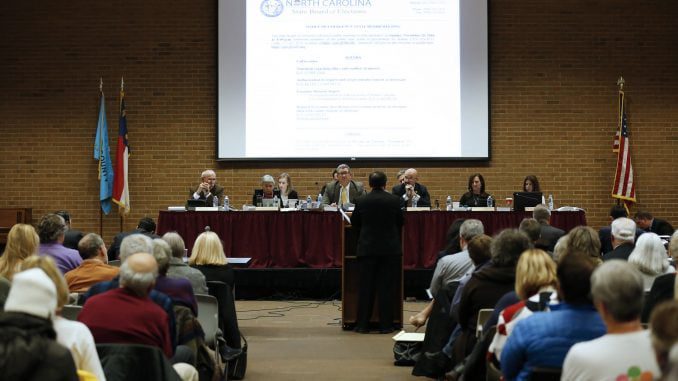
RALEIGH As December approaches, the results for several races, including N.C. governor, remain in question. This week the right-leaning Civitas Institute filed a federal lawsuit claiming addresses on all same-day registration ballots should be verified before being counted, while the left-leaning Southern Coalition for Social Justice filed a complaint saying the Civitas suit should be rejected. The two groups are jumping into a battle that is becoming the culmination of years of arguing over how to protect the integrity of the ballot box while ensuring voting access.The legal wrangling came as Gov. Pat McCrory filed Tuesday for a recount of the election results. Chuck Stuber, the Republican candidate for state auditor, joined McCrory in the request.”With serious concerns about voter fraud emerging across the state, it is becoming more apparent that a thorough recount is one way the people of North Carolina can have confidence in the results, process and system,” McCrory’s request letter read.Eariler in the week the N.C. State Board of Elections directed counties to keep counting ballots, despite challenges in 52 counties from McCrory and other candidates alleging possible voter fraud. McCrory currently trails Democrat Roy Cooper by approximately 7,700 votes, under the 10,000 vote margin legally required to eliminate a recount option. “With many outstanding votes yet to be counted for the first time, legal challenges, ballot protests and voter fraud allegations, we must keep open the ability to allow the established recount process to ensure every legal vote is counted properly,” said Russell Peck, McCrory’s campaign manager.The Cooper campaign insisted to the N.C. Board of Elections that the number of ballots in question would not change the outcome of the governor’s race.”Unless it’s going to change the outcome of the election, then let’s get on with it, let’s finish this election and then address the issues we need to address; prosecute an individual who may have cast an improper ballot if there are grounds to do so and clean up our registration lists so the next time we don’t have this same problem with these individuals,” Kevin Hamilton, a lawyer for the Cooper campaign and N.C. Democratic Party, told the state board in Tuesday’s hearing.Civitas’ lawsuit adds another layer to the election. Filed with the Eastern District Federal Court, it could add a month or more to the process if the state board must verify same-day registration addresses just as they would registrations that are filed prior to Election Day. Civitas says the suit highlights a fairness issue.”If all the other 6 million-plus voters have had to go through a process, then the people who are doing same-day by law and by fairness should go through the same process,” said Civitas president Francis DeLuca. “We aren’t saying throw out the votes or don’t count them, we are saying verify the addresses.”Approximately 90,000 voters registered and voted on the same day in the weeks leading up to the Nov. 8 election, and this lawsuit could bring into question all of those ballots. Verification of the addresses requires the board of elections to mail a non-forwardable letter to the registrant’s address. If it is returned as undeliverable, the board is required to make a second attempt at verification by mail. If a letter is undeliverable a second time, the ballot is not counted and the voter often moved to “inactive” status. In past studies, approximately 3 percent of all one-stop registrations are ultimately not able to be verified.The Southern Coalition for Social Justice filed their complaint this week with the 4th Circuit Court of Appeals, a court that previously sided with them in July when the same group sued to overturn parts of the Voter ID laws passed in 2013. In that suit the three-judge panel reinstituted the same-day registration which was eliminated in the vote ID law. The SCSJ says Civitas’ suit amounts to litigating the issue again, while Civtias says they want the verification process already required by law to move forward.Regardless of the suits, allegations of extensive fraud or irregularities may represent a framework for a potential contested election. If contested, the election would head to the N.C. General Assembly for resolution, but not before the the first of the new year with Jan. 7, 2017, as the scheduled Inauguration Day. Meanwhile, Cooper, who still leads in the vote count, has already initiated transition activities and launched a website for those applying for jobs in a Cooper administration.




